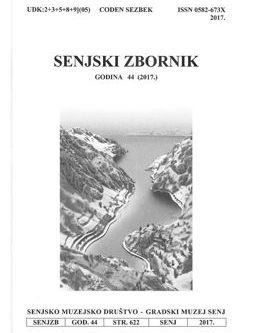Potencijali i perspektive razvitka Velebitskog podgorja
The potentials and perspectives of the development of Velebit Podgorje
Author(s): Čedomir Dundović, Damian Dundović, Kristina DundovićSubject(s): Regional Geography, Environmental Geography, Policy, planning, forecast and speculation, Demography and human biology, Human Ecology, Environmental interactions, Migration Studies, Tourism, Globalization, Transport / Logistics
Published by: Senjsko muzejsko društvo i Gradski muzej Senj
Keywords: Velebit Podgorje; potentials; perspectives of development; sustainable development; SWOT analysis; economic and social development;
Summary/Abstract: Velebit is not only the largest Croatian mountain but is the only littoral mountain that divides two geographically essentially diverse areas: the Mediterranean and continental – mountain regions, in other words, the Croatian Littoral from Mountain Croatia. The littoral slope of Velebit includes Podgorje which begins near Sveti Juraj where it gradually spreads and rises to Jablanac, whilst in the southern part Velebit gradually passes into the northern – Dalmatian karst plateau. The natural conditions and setting along the sea have contributed in the past to the development of forestry, agricultural and livestock production, shipping, fishing, trade, hunting and tourism. The transport connectivity of the settlements of the Velebit littoral slope with the outside world always took place via the sea, because there were no land routes or they were in such a state that they did not allow a better connection between the settled places. The population coverage of their region is dominated by numerous hamlets, 1-6 km apart and set in the interior from the sea mostly in the central vegetational belt because bare rock dominates along the coastline. Nature has influenced this separation because any settlements had to be placed where the ‘bura’ does not blow. Due to this in the Velebet littoral area, with the exception of Senj, three more important coastal settlements developed: Sveti Juraj, Jablanac and Karlobag. The lack of traffic and communal infrastructure and other necessary amenities (educational, health, economic and so on) are the reason for the large depopulation of this area which in modern conditions is one of the least populated regions of the Republic of Croatia. However, the potential values of this region point to the possibilities of its speedier development. The aims and guidelines of development point primarily to the protection of the natural and cultural resources with an emphasised need in making developmental economic programmes. Besides the development of a road network which in this area would prompt new developmental potentials with the planned measures of development, the development of economic activities (development of tourism, mariculture, nautical tourism ports, health-recreational tourism, hunting tourism, fruit growing and horticulture, livestock breeding, forestry and timber – manufacturing activities, the use of the energy potentials of the wind and sun, the development of manufacturing, trade and free customs zones and so on) and social activities in the decentralisation of the system of centralised settlements (educational, health and cultural infrastructure) should be stimulated. In this paper a special emphasis is made on the appraisal of the natural potentials, of sustainable development and the evaluation of the possibility of the revitalisation of Podgorje. To this end a SWOT analysis was produced as a basic prerequisite for future development.
Journal: Senjski zbornik - prilozi za geografiju, etnologiju, gospodarstvo, povijest i kulturu
- Issue Year: 44/2017
- Issue No: 1
- Page Range: 501-516
- Page Count: 16
- Language: Croatian

